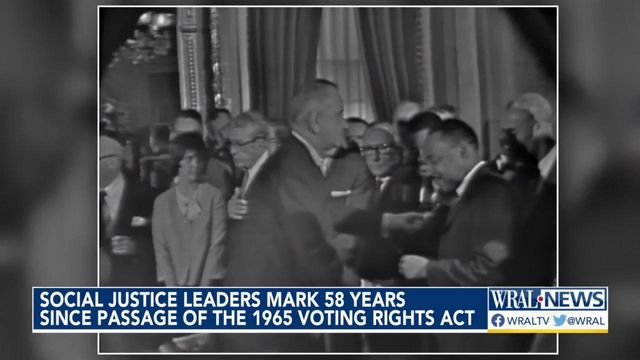Voting rights activists mark 58 years since passage of the 1965 Voting Rights Act
Sunday marked 58 years since the passage of the Voting Rights Act.
The act outlawed discriminatory voting practices adopted in many southern states after the Civil War.
A lot has changed since then, with rollbacks, such as requiring proof of identification at the polls, remaining as a reminder of the barriers that are still present.
“As soon as it went into place, it was immediately contested,” said Chris Shenton, a voting rights lawyer at Southern Coalition for Social Justice. “And it has been contested since that day.”
Shenton said the act has changed dramatically just within the last decade.
“Another decision of the United States Supreme Court 10 years ago struck down a core provision of the Voting Rights Act,” Shenton said. “And the aftermath of that decision is still being felt today in a very profound way.”
Supreme Court ruled in 2013 that a key provision of the landmark Voting Rights Act could not be enforced unless Congress came up with an up-to-date formula for deciding which states and localities still needed federal monitoring.
in a 5-4 ruling, the justices said the law Congress renewed in 2006 relied on decades-old data that did not reflect racial progress and changes in U.S. society.
Shortly after the decision, lawmakers in North Carolina introduced and passed a voter ID bill that required state-issued ID in order to vote. The bill was ruled constitutional by the Republican-majority North Carolina Supreme Court in April.
Bob Phillips, Executive Director of Common Cause NC, a nonpartisan, grassroots organization dedicated to upholding the core values of American democracy, said the threats have shown up in North Carolina since that day.
“Here in North Carolina, in particular, we see threats, even right now as we are speaking at the legislature to our right to vote,” Phillips said. “Certainly, that’s a concern for us.”
Phillips and other advocates say the new voter ID laws will have a drastic impact on those who may not have a DMV in their county, the elderly and underrepresented communities.
"It seems that some of the lawmakers are pushing harmful legislation because they have bought in to this election denier the narrative," Phillips said. "We've got to all push back and fight to make sure that voting is easy and accessible for all."
As for the future of the Voting Rights Act, Shenton believes the people the act was meant to protect will be the driving force for its survival.
"I think it will. continue to be driven ultimately by the people who insisted," Shenton said. "The same kinds of people who won the protections of the voting rights act to begin with."












